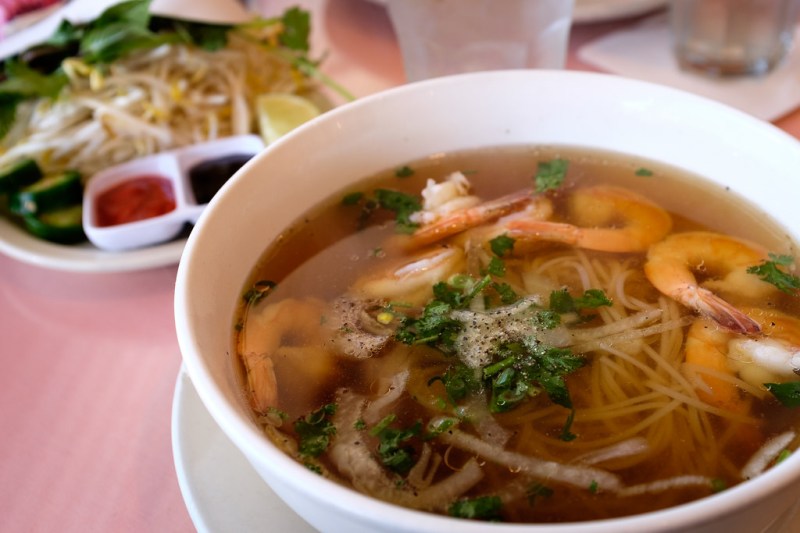It’s Lunar New Year, and the sun has just set over the terracotta roofs on the horizon. With dusk comes a cool, cleansing breeze into the sprawling neighborhoods of Santa Clara and through the screen door of my grandparents’ home. Here, in the city of my birth, the immigration site of my ancestors, my family celebrates the New Year with bright red envelopes and good-natured gambling, handing out lì xì and playing Bầu Cua Tôm Cá. The scent of freshly made phở wafts through the home. Dozens of cousins, aunts and uncles gather here tonight for the festivities and good food. My mother’s mother, my bà ngoại, hands each grandchild lì xì and wishes us good luck in the New Year. The corners of my eyes crinkle, and I bark out a laugh as my cousins crack a joke at one of our uncles.
We take a photo with all the extended family, and my sister, father and I both stick out like sore thumbs. Our lighter skin, hair and blatant Caucasian features make my blood relatives and I look more like strangers than family. I wonder how it’s possible to feel this warm belonging and cutting alienation so strongly at the same time and am reminded that half of my heritage is hidden behind my face.
For many people, defining personal identity isn’t easy. But for people of multiracial backgrounds, it’s especially difficult. Contradictory senses of belonging, doubts about legitimate claims to multiple cultures and society’s general ignorance towards the complex issues surrounding the mixed-race experience are persistent forces that muddle personal narratives of origin. As someone who is half-Vietnamese, half-Caucasian and very white-passing, I’ve dealt personally with the issues that arise when someone of multiracial background tries to confront their racial identity.
For myself and many others who identify as mixed, there are numerous factors that contribute to the construction of a racial identity. Parental influence and child-raising strategies, external perception of identity (based off of physical attributes), self-perception of identity and peer-validation all play a role in the process of self-identification. One of the most common experiences that people of mixed-race backgrounds share is something called racial impostor syndrome. According to NPR’s podcast series, Code Switch, racial impostor syndrome is when people of multiracial backgrounds “feel like imposters of one or more of their identities because they don’t fit neatly into any one category.” Discrepancies between physical appearance and cultural background can create significant uncertainty in regards to racial belonging. Whether it’s constantly fielding the ever-dreaded “What are you?” question or being told “Well, you aren’t really Vietnamese” but then when doing well in school being told “It’s because you’re Asian,” confusion over racial identity can have serious effects on mental and emotional health. Microaggressions like the ones above are painful reminders that people who are mixed don’t have a racial home to return to and are forever caught in the space that exists between cultures.
Something I find myself currently struggling with is the balance between my private and public identities. On a private, personal level I identify as more culturally Asian/Vietnamese than white. I grew up taking my shoes off at the front door, eating rice with every meal, speaking broken Vietnamese with my mom at home, going to Vietnamese school every Saturday and always looking forward to the next time I could drink boba. But on a public level, because of its inherently political nature, my concept of identity becomes much more complicated. The choice for me to identify as Asian/Vietnamese at the public scale would have implications that are very important to be aware of. Choosing to identify within the Asian-American community as a white-passing individual might, in my eyes, be unfair and disingenuous to those who identify as Asian-American and come from conventional, monoracial Asian-American backgrounds. For example, because my mom is Vietnamese, I technically could apply for scholarships targeted to Asian minorities. But because I’m white-passing, I generally haven’t experienced traditional forms of discrimination or prejudice that many monoracial Asian-Americans may face on a daily basis. For this reason, to apply for the minority scholarship which tries to correct for these injustices that I have not suffered from would be wrong, and in this context I could not let myself identify as Vietnamese, at least in a monoracial sense.
To some people, this crisis over racial identity may sound exaggerated and dramatic. But for people who are forced to grapple with the question of their personal identity every day of their lives, it is anything but. Many people do not realize how much of a luxury and privilege it can be to be able to clearly and definitively say “I’m Mexican” or “I’m Chinese” and never doubt that they have a single group to identify with and come home to. Despite these ongoing challenges, though, mixed race individuals are nevertheless learning how to develop their own beautifully nuanced identities and changing public discussions around race. Perhaps one day, we’ll live in a world where pressures to identify with certain racial groups are no longer such compulsive forces.
Contact Leila Doty at ldoty ‘at’ stanford.edu.
